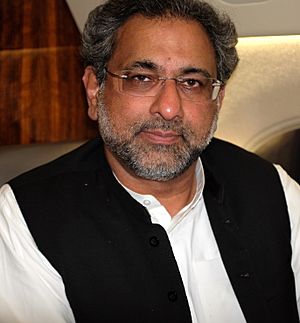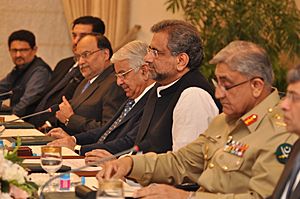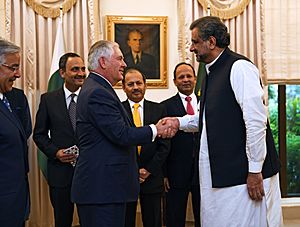Shahid Khaqan Abbasi facts for kids
Shahid Khaqan Abbasi (born 27 December 1958) is a Pakistani politician and businessman. He served as the 18th Prime Minister of Pakistan from August 2017 to May 2018. He currently leads a political party called Awaam Pakistan (AP) as its chairman. Before becoming Prime Minister, Abbasi was a senior leader in the Pakistan Muslim League-N (PML-N). He also served as the secretary-general of the Pakistan Democratic Movement (PDM), which was a group of political parties working together. He has been a Member of the National Assembly of Pakistan for many terms since 1988.
Abbasi began his political journey after his father passed away in 1988. He was elected to the National Assembly six times from his home area. After the PML-N won the 1997 general election, he became the Chairman of Pakistan International Airlines (PIA). He held this position until 1999. Later, after the 2008 general election, he briefly served as the Minister for Commerce. In 2013, he became the Minister for Petroleum and Natural Resources. He held this role until July 2017, when Nawaz Sharif, the Prime Minister, was no longer able to hold office. In August 2017, the National Assembly elected Shahid Khaqan Abbasi as the Prime Minister of Pakistan.
Quick facts for kids
Shahid Khaqan Abbasi
|
|
|---|---|
| شاہد خاقان عباسی | |

Abbasi in 2017
|
|
| 18th Prime Minister of Pakistan | |
| In office 1 August 2017 – 31 May 2018 |
|
| President | Mamnoon Hussain |
| Preceded by | Nawaz Sharif |
| Succeeded by | Nasirul Mulk |
| Leader of AP | |
| Assumed office 23 June 2024 |
|
| Deputy | Miftah Ismail |
| Preceded by | Zafar Mirza |
| Minister for Petroleum and Natural Resources | |
| In office 7 June 2013 – 28 July 2017 |
|
| Prime Minister | Nawaz Sharif |
| Preceded by | Asim Hussain |
| Succeeded by |
|
| Minister for Commerce | |
| In office 31 March 2008 – 13 May 2008 |
|
| Prime Minister | Yusuf Raza Gillani |
| Preceded by | Humayun Akhtar Khan |
| Succeeded by | Ameen Faheem |
| Chairperson Pakistan International Airlines | |
| In office 27 December 1997 – 12 October 1999 |
|
| Prime Minister | Nawaz Sharif |
| Preceded by | Farooq Umar |
| Succeeded by | Ahmad Saeed |
| Constituency | NA-124 Lahore-II |
| Member of the National Assembly of Pakistan | |
| In office 14 October 2018 – 10 August 2023 |
|
| Constituency | NA-118 Lahore-II |
| In office 1 June 2013 – 31 May 2018 |
|
| Constituency | NA-51 Murree-I |
| In office 17 March 2008 – 16 March 2013 |
|
| Constituency | NA-51 Murree-I |
| In office 17 February 1997 – 12 October 1999 |
|
| Constituency | NA-51 Murree-II |
| In office 19 October 1993 – 5 November 1996 |
|
| Constituency | NA-51 Murree-II |
| In office 6 November 1990 – 18 July 1993 |
|
| Constituency | NA-51 Murree-II |
| In office 2 December 1988 – 6 August 1990 |
|
| Constituency | NA-51 Murree-II |
| Secretary General of PDM | |
| In office 20 September 2020 – 18 September 2023 |
|
| President | Fazal-ur-Rehman |
| Personal details | |
| Born | 27 December 1958 Murree, Punjab, Pakistan |
| Political party | AP (2024-present) |
| Other political affiliations |
|
| Spouse |
Samina Khaqan Abbasi
(m. 1986) |
| Children | 3 |
| Parent |
|
| Relatives | Muhammad Riaz Khan (father-in-law) Sadia Abbasi (sister) |
| Education | Lawrence College |
| Alma mater | |
| Signature |  |
Contents
Early Life and Education
Shahid Khaqan Abbasi was born on 27 December 1958 in Dewal village, Murree District, Punjab, Pakistan. He went to Lawrence College in Murree. In 1978, he studied at the University of California, Los Angeles, where he earned a bachelor's degree in electrical engineering.
After this, he started his career as an electrical engineer. In 1985, he went to George Washington University and received a master's degree in Electrical Engineering. After finishing his studies, Abbasi worked as an electrical engineer.
Political Career
Starting in Politics (1988–1997)
Abbasi's political career began after his father, Khaqan Abbasi, passed away in 1988. In May 1988, new elections were called. Abbasi ran for a seat in the National Assembly from his home area. He was elected for the first time at the age of 30 as an independent candidate. After winning, he joined the Islami Jamhoori Ittehad (IJI) party.
His time as a Member of the National Assembly ended in August 1990 when the government was dismissed. New elections were held in October 1990. Abbasi was re-elected as a candidate for IJI. He then became the Federal Parliamentary Secretary for Defence.
In October 1993, new elections were held. Abbasi was re-elected for the third time, this time as a candidate for the Pakistan Muslim League (N) (PML-N). He served as the chairman of the National Assembly's Standing Committee on Defence. His term ended in 1996 when the government was dismissed again.
In February 1997, Abbasi was re-elected for the fourth time as a PML-N candidate. PML-N won a clear majority in the National Assembly. That same year, Prime Minister Nawaz Sharif appointed him as the Chairman of Pakistan International Airlines (PIA). During his two years at PIA, he worked to improve the airline. His time as Chairman of PIA ended in 1999.
Fifth and Sixth Terms (2002–2013)
General elections were held in October 2002. Abbasi ran as a PML-N candidate but did not win this election. After this, he focused on Airblue Limited, an airline he founded in 2003. He was its first chairman until 2007.
After Nawaz Sharif returned to Pakistan in 2007, Abbasi joined him. He ran for the National Assembly again in February 2008 and was re-elected for the fifth time. After the election, PML-N formed a government with the Pakistan Peoples Party (PPP). Abbasi became the Minister for Commerce in March 2008. However, he resigned in May 2008 when PML-N left the coalition government.
As Minister for Petroleum
In May 2013, another election was held. Abbasi ran for the National Assembly as a PML-N candidate and was re-elected for the sixth time. After PML-N won the election, he became the Minister for Petroleum and Natural Resources. His main task was to help solve Pakistan's electricity problems.
As Minister for Petroleum, he suggested using liquefied natural gas (LNG) for electricity production because it was cheaper. In February 2016, Abbasi signed a large agreement with QatarEnergy LNG to buy LNG for 15 years. This deal was meant to help Pakistan meet its energy needs. The LNG project was seen as successful and helped reduce gas shortages. Abbasi stopped being Minister for Petroleum and Natural Resources on 28 July 2017.
Prime Minister (2017–2018)
Becoming Prime Minister
Nawaz Sharif resigned as Prime Minister on 29 July 2017. He suggested his brother, Shehbaz Sharif, as his replacement. However, Shehbaz Sharif was not a member of the National Assembly at that time. So, Shahid Khaqan Abbasi was chosen as a temporary Prime Minister for about 45 days. This would give Shehbaz Sharif time to get elected to the National Assembly.
On 1 August 2017, the National Assembly elected Abbasi as Prime Minister of Pakistan. He won with 221 votes. He said, "I may be here for 45 days or 45 hours, but I'm not here to keep the seat warm. I intend to work and get some important things done." On the same day, he took his oath as Prime Minister. Later, it was decided that Abbasi would continue as Prime Minister until the general election in June 2018.
Forming the Cabinet
After becoming Prime Minister, Abbasi formed a cabinet with 43 members. Most of the ministers from the previous government kept their jobs. On 4 August 2017, 27 federal ministers and 16 ministers of state were sworn in. The cabinet was later expanded to 47 members and then to 58 with the addition of advisers and special assistants.
Abbasi appointed Khawaja Muhammad Asif as the full-time Minister for Foreign Affairs. This was the first time since 2013 that Pakistan had a dedicated Foreign Minister. He also included a Hindu politician, Darshan Punshi, in the federal cabinet, which was a first in over 20 years.
Policies and Initiatives
In his first speech as Prime Minister, Abbasi said his main goals would be security, tax reform, agriculture, education, health services, and solving the country's power crisis. He promised to continue the policies of Nawaz Sharif. He also said he wanted to expand the tax system and ban automatic firearms.
Energy Policy
Abbasi created seven new ministries to improve government work. One important new ministry was the Ministry of Energy. Abbasi kept the role of Energy Minister for himself. He focused on the energy sector and promoted the use of LNG. He wanted to reduce the use of expensive oil and coal power plants. He aimed to end power outages in the country by November 2017.
As Prime Minister, Abbasi opened two new LNG terminals at Port Qasim. These terminals helped increase the supply of imported LNG. He said LNG was the most affordable way to solve Pakistan's energy problems. In December 2017, he ordered that some power plants be converted to use LNG to lower electricity costs. He also banned the import of furnace oil.
Domestic Policy
Abbasi took charge of major cabinet committees dealing with economic matters. This gave him more control over financial issues. On 26 August, he approved the results of the 2017 Census of Pakistan, which showed the country's population was 207.77 million.
To speed up projects related to the China–Pakistan Economic Corridor (CPEC), Abbasi also kept the role of Minister of Planning and Development for a short time. He later gave this role back to Ahsan Iqbal.
Abbasi visited Karachi on 12 August 2017 and promised funds for infrastructure development in Karachi and Hyderabad. On 13 September, his cabinet approved a bill to extend the powers of the Supreme Court and the Islamabad High Court to the Federally Administered Tribal Areas (FATA). This was a step towards merging FATA with Khyber Pakhtunkhwa. The bill was passed in January 2018.
In November 2017, the Ministry of Interior stopped issuing licenses for all automatic firearms across Pakistan. This was part of Abbasi's plan to make Pakistan free of automatic weapons.
Foreign Policy
After the United States announced a new policy on Afghanistan in August 2017, Abbasi made his first foreign trip to Saudi Arabia. He discussed the new U.S. strategy and worked to strengthen relations between Pakistan and Saudi Arabia. On 23 August, the National Security Council (NSC) rejected the accusations made by the U.S. President.
In September 2017, Abbasi traveled to the United States to speak at the United Nations General Assembly. He met with the U.S. Vice-president and briefly with the U.S. President. He also met with the Presidents of Iran and Turkey.
On 18 October 2017, the U.S. Vice-president thanked Pakistan for helping to safely recover a Canadian-American couple. On 24 October, the U.S. Secretary of State visited Pakistan to improve relations. He met Abbasi and stressed that Pakistan needed to increase its efforts against certain groups.
In December 2017, Abbasi attended a conference in Turkey about Jerusalem. He spoke against the U.S. decision to recognize Jerusalem as Israel's capital.
In January 2018, relations with the United States faced a challenge when the U.S. President accused Pakistan of not doing enough in the War on Terror. The U.S. later suspended security aid to Pakistan. Abbasi said the U.S. aid was not very significant.
Leaving Office
On 31 May 2018, the PML-N government completed its five-year term. This made it the second civilian government in Pakistan to finish a full term. Shahid Khaqan Abbasi was succeeded by caretaker prime minister Justice Nasirul Mulk on 1 June 2018. This caretaker government was in place until the 2018 general elections were held on 25 July 2018.
It was noted that Abbasi lived in his own home in Islamabad while he was Prime Minister, not the official Prime Minister House. He was also reported to be the highest taxpayer in Pakistan in 2018.
After Being Prime Minister
In the 2018 general election, Abbasi ran for a seat in the National Assembly but was not successful. He was re-elected to the National Assembly in a by-election held on 14 October 2018. He took his oath as a member of the National Assembly on 1 November.
In December 2023, he decided to leave the PML-N party. On 2 June 2024, he announced that he would be starting a new political party called Awaam Pakistan.
Personal Life
Family
Abbasi comes from a wealthy political family from Dewal village. His family belongs to the Dhund Abbasi clan, which is common in northern Punjab.
Abbasi is married and has three sons. His father, Khaqan Abbasi, was an air commodore in the Pakistan Air Force. He later became a Member of the National Assembly and a Federal Minister. He passed away in 1988 in a military accident. Abbasi's sister, Sadia Abbasi, has been a member of the Senate of Pakistan. His father-in-law, General Muhammad Riaz Abbasi, was a director-general of the Inter-Services Intelligence (ISI).
Aviation and Parachuting
Shahid Khaqan Abbasi is very interested in aviation and is an amateur skydiver. He was the first Prime Minister of Pakistan to fly in an F-16 Fighting Falcon and a military helicopter. He has been a pilot for over forty years. In December 2017, he became the first Prime Minister of Pakistan to go on a submarine in the open sea. He even performed some submarine procedures, which earned him a special Pakistan Navy badge.
He is known to be a private person who does not seek much media attention.
Health
On 8 June 2020, Abbasi tested positive for COVID-19 during the coronavirus pandemic.
Wealth
Abbasi is a businessman and an expert in aviation. He founded Airblue in 2003. He is one of the wealthiest politicians in Pakistan. His assets include shares in Airblue, a house in Islamabad, a hotel business, and land in Murree.
See also
 In Spanish: Shahid Khaqan Abbasi para niños
In Spanish: Shahid Khaqan Abbasi para niños
 | James B. Knighten |
 | Azellia White |
 | Willa Brown |



